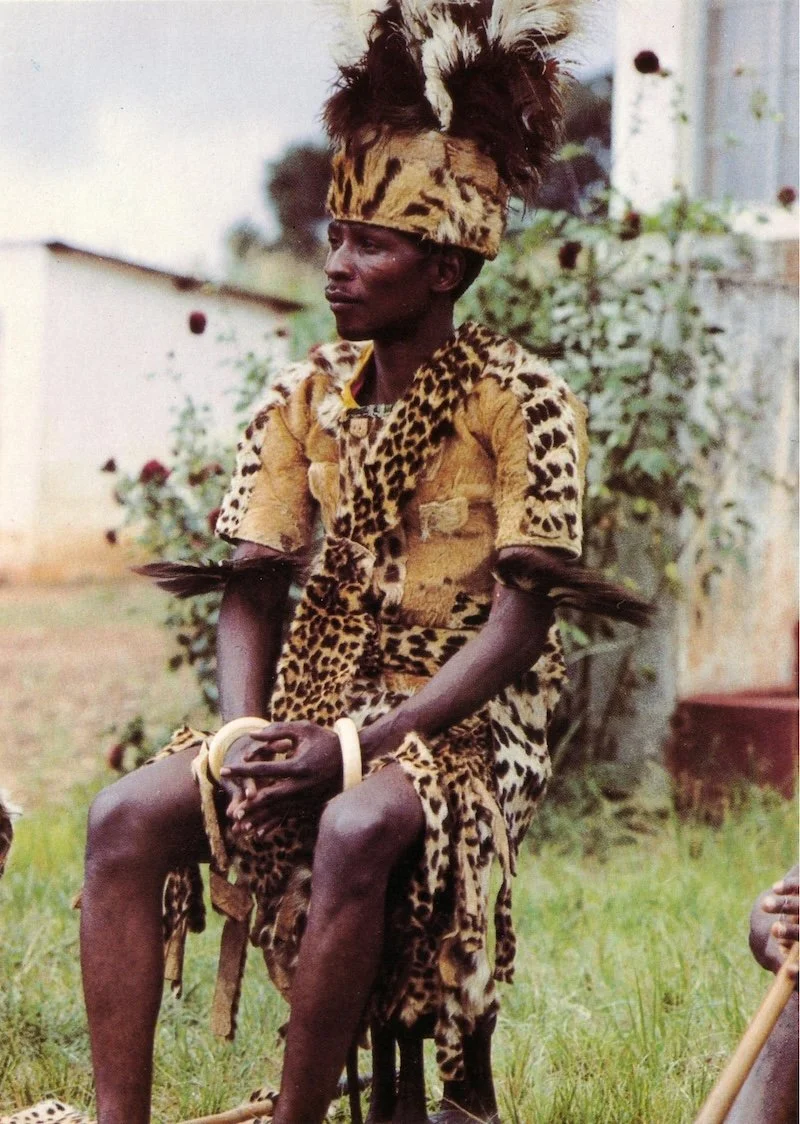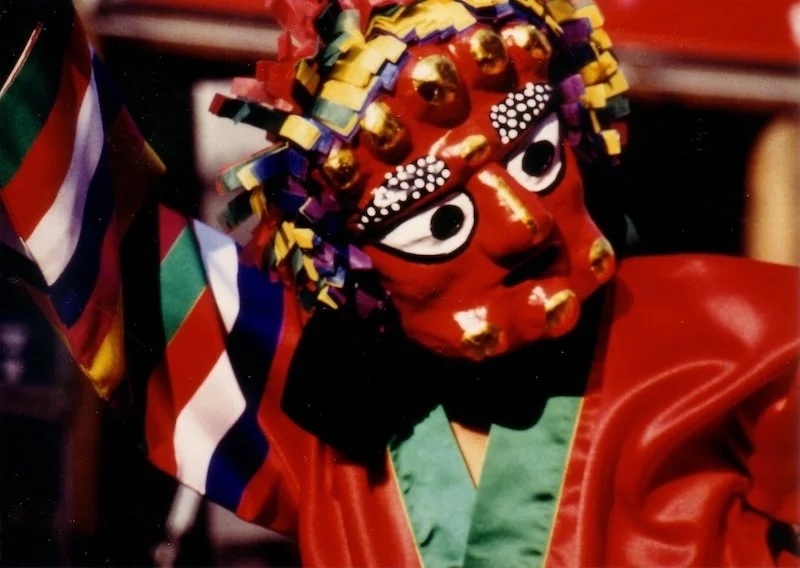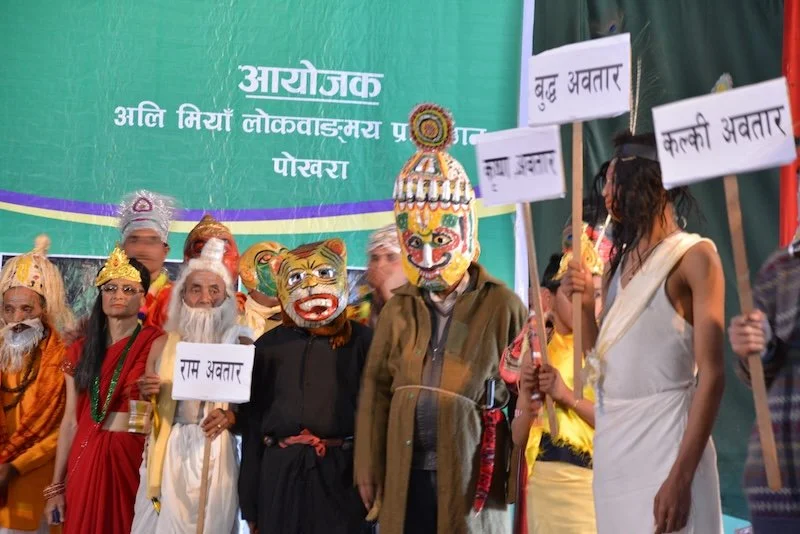Performance Ethnography
Interviewing Machai, !Xuu Bushman healer, lower Kalahari
An ongoing, thirty-year pan-cultural folk, ritual, and shamanic performance research and documentation project. The goal is to 1) investigate and document vanishing traditions and 2) articulate and promote an alternative, earth-centric performance expression for our contemporary world. The project's ambition is to offer a new form of indigenous performance, founded in traditional expressions and shaped in response to a globalizing world threatened with environmental collapse. Appreciating and re-imagining the wisdom and expressions of those who have lived traditionally with their indigenous place to create a new/old way of being with the earth. We are all becoming indigenous again.
Field research, Tamil Nadu, India
Interviews in Hunan
Riccio emphasizes that he is not an anthropologist by training, but when he works with a theatre based on cultural tradition, he often applies anthropological methods. Indigenous cultures are essentially oral, and when put into written form, only a small part of them is conserved. People, however, have much more knowledge, which is about to disappear if no one becomes interested in it.
Kumppani Magazine, Finland
Current Research Project / Hunan China
Miao and Tujia, Xiangxi Autonomous Prefecture
In trance with Miao spirit medium
Visual mnemonic used by Miao Xiangxi, Hunan, China
Ritual steps diagram
Shi: I am drawing in the water action; its power comes from the master Lao Zi, the master of all Taoism. I write the side characters in the water on the table. The magical words transform the water in the process, becoming the “Law Water” or magic water. Riccio: How does the water become magical? Shi: Magical words taught him by his teacher…you must decide to accept the words on a special ritual step by step the words are given.
Riccio: You are well-traveled and have demonstrated on TV and around the country. Why do you do this?
Shi: I am also a teacher. Traveling and showing others is the metamorphosis of learning, just like a tree. If the Tree grows from new branches, you learn from other branches, not from your family. I learn, and I teach.
Riccio: Who taught you?
Shi: I Learned from my father—I learned from his trunk. At the trunk is where it is more real, more magic—at the branches, the magic is not as strong. I get up very early to recite the magical words to learn how to make and hold the water magic.
I get up very early to recite the magical words to learn how to make and hold the water magic.
Riccio: How long did it take you to be initiated as a Badai?
Shi: It was twenty-one days. But this was after a long study with my father. I was about twenty years old when I started my studies.
Riccio: Did you want to become a healer, or were you called?
Shi: The spirits called me. The spirits know my family well. For many generations, my great-grandfathers and beyond were healers. Only one son from each generation is chosen to carry this family forward. I was chosen. Only the most honest and dutiful is chosen.
Riccio: How do you eat the water bowl?
Shi: If the spirits are with you must be able to do it! It would help if you bit the bowl without hesitation—it is the test of the gods.
Riccio: Now you are training others. If I wanted to become your student, what would you tell me?
Shi: There are pre-conditions before we can begin. You must agree with your master and swear to your master to tell him all the things you can and cannot do. It would help if you kowtowed to the master. And as your master, I must judge you honestly, watch you, and have a good heart—to avoid evil or do it for money. If the master and student follow this way, then the student will become a healer and begin their own practice.
From an interview with badai, She Jin He
Miao Spirit Medium
Zambia
N’goni Tribe / N’cwala ritual
Documentation of a ritual presented by the Ngoni people of Zambia. Chipata, Zambia on the Zambia-Malawi border, April 1994. A three-day presentation of a formerly banned ritual. During the ritual, any debts, antagonisms or affronts from the previous year could be settled without consequences, often leading to death or injury. In the modern version, a young bull was endowed with the year's ill will and feelings of the community and sacrificed.
With Ngoni Clan Induna
Video Excerpts
India
Therukoothu and Folk Performance / Tamil
Theru Koothu is a 2000-year-old dance/theatre folk tradition still practiced today in Tamil Nadu, southern India. Both sacred and profane, ritual and entertainment, the performances begin after 9 p.m. and continue until dawn. In this video, shot in February 2013, the Koothu troupe performs sections of the Hindu epic, the Mahabharata, to console a family and end their 15-day mourning period.
Documentary / 15:26
!Xuu and Khwe Bushmen, Kalahari
Oral History Recording Project
Video Documentation / 12:54
Gomez's telling of the "Two Stones" brought the group to life. Everyone wanted to tell the story as they remembered it. We agreed that "Two Stones" would be the basis of our performance. With a large artist's pad at the center, the group gathered in a circle. The drawing of the story and the agreement to perform the story suddenly gave our work an objective, structure, and immediacy satisfying the pragmatic Bushmen. The drawing and the narrative also provided a medium by which we could directly communicate without language or a translator. After many drawings and story sessions, an agreed-upon telling evolved.
In the desert, there are two stones.
They are by themselves out in the open
Surrounded by grass and small bushes.
The stones are called ~ (n) Whatsu.
‘That means people come out of here.’
They are like two houses with a path.
Both have big holes in them like the entrance to a hut.
The tall stone is a man, and the short one is a woman...(continues)
Bushman drawing of their origin myth
Korea
Mudang, shamanic folk tradition research
Mu dang Jong
As she spoke Mrs. Jong became younger, almost child-like, her face and shoulders moving with dance rhythms only she heard; occasionally she shuddered with some unseen touch. Her vocal patterns fell into the patterns of a chant as we all watched with curiosity, fascination, and anticipation. Chang Chong-il slept contentedly in her grandmother’s lap. Mrs. Jong’s two lady friends nodded with affirmation, swaying and rocking as if they, too, felt the spirits near. Mrs. Jong’s low singing increased in volume to encourage the spirits to enter the room. Her body shuttered as if suddenly possessed. Concerned, her son and daughter came near and watched their mother speak in the dialect of the spirits. Then Mrs. Jong stopped as suddenly as she had started, looking at us as if someone just startled into wakefulness, wondering why people were staring at her. She lit a cigarette, “The spirits like to smoke,” she laughed. “The spirits are good to me, they protect me when I am on the knives. So I smoke to please them.
from Worlds Away, travel memoir
Images and object from !Xuu mythology
Healing Ritual excerpt
Umbanda
Syncretic spiritual belief / San Paulo, Brazil
Many people say oh, spirits. Spirits are people. The difference is that we have bodies, and they don't. But they are people like me. Spirits once had a body. So if they appear, they want to talk. Why don't you ask? What do you ask? they are talking. They have a language and vocabulary, which are part of their ways of talking. You see here are the candles, the herbs, the smoke. Everything is related to energy. This is communication. How you handle the energy and spirits is energy and how you deal with them. So perhaps your way is not this like this? Perhaps it is in other places, but you have to find a way to talk to them and where you feel better, where you feel best, where you think, and when you are in the right way.
—from an interview/seance with a spirit medium
Mexican Curandero
Spiritualism and Healing
Azenet Macedo Angulo
It is a responsibility. I always work on both sides of everything. Everything can hurt you or heal you depending on how you take it—even plants. If you take it the wrong way, the plant can kill you. But if you take it well for praying and healing, you need to know how it works and the spirit of the plant. If not, you may not be capable of assimilating the plant's power because those plants are on the earth for some reason. And if not, it's not for recreation. It gives you the power to raise your life and help others. It's an arduous path.
It takes work. It would be best if you did it by yourself, and, well, you have a lot of guardians like spirits, people, your masters, and family. But the most challenging part is when you need to do it by yourself.I am by myself, in silence, and I am seeing my family, my blood family, and resting, reconnecting with myself. Because I cannot, I cannot go looking for work if I don't stop to heal myself. I cannot give healing if I'm not dealing with myself.
—from an interview
Nepal
Folk Performance
The original dance in the village is a bit different from what we see today. Two years ago, when we had a beauty pageant here, we were running a Magar beauty contest, and we had to take the candidates to the villages to show them our culture. That is where they saw how they danced this particular dance for the first time. It was different than how we were performing the dance. The boys had drums in their hands, which was much more rhythmic than in the city. It is interesting to see how, when it comes to the city, it becomes more simplified. Things in the country no longer have meaning when they come to the city.
—from and Interview, Pokharar, Neplal
Ethiopia
Christian Orthodox Ritual research
Market Place healers, Addis Ababa.
Tanzania, Kenya, Burkina Faso
Makonda ritual, Tanzania
Stories cover thick the world, people, events, past present future waddle around. What is out there is a ghost. It seems real. I reach for it, whoosh it evaporates something else takes its place. Why does it always change? But that’s okay. Stories are intimate, pass through, around me, caress, seduce, punch, slam bam, what the fuck, bump into, excuse me? I chase them thinking I will understand, please for a moment what is going on, what can I, should I do? Oh yeah, it is all clear now, it all makes sense.
from an interview, Voyage Dallas








































































































